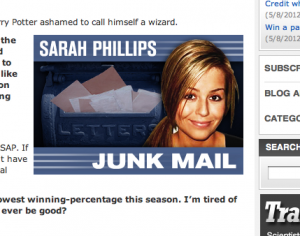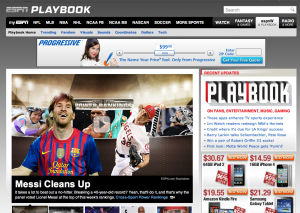Content Marketing
ESPN’s Scandalous Blogger Brouhaha Sparks Alarm
In the aftermath of the Sarah Phillips fiasco at espn.com, content providers are realizing their brand may be more tied to the behavior of their freelancers than they thought.

The incident captivated the internet publishing world last week, partly because it provided a cautionary tale for the industry and partly because the saga had the classic elements of a sensational story – mystery, greed, corruption and a pretty young blonde.
The ramifications of having a proud brand such as Disney, ESPN’s parent, tied to a possible internet scam could have a chilling effect across the content industry.
The recap
It started with 20-something Sarah Phillips, who garnered attention on the comment board of the sports gambling website Covers.com. Her writing and engagement with other users – as well as her humorous slant on sports gambling – landed her a job as a columnist/blogger for the site. She then parlayed that gig into a new column/blog for what is now ESPN’s Playbook on espn.com.
This promotion from the shadowy underworld of sports gambling content to an arm of the mega-brand Disney Inc. is where things started to unravel. Phillips found herself under siege from another young content creator who claimed he was being extorted by her and a partner – who were allegedly using the ESPN name to give them the allusion of credibility. The begrudged victim went on the record with deadspin.com which pursued the story with gusto – even questioning whether Phillips even existed or if perhaps she was just a pretty face for a ghost blogger. Amid the unwanted controversy, ESPN cut ties with Phillips.
 The alleged scam, as it was reported on DeadSpin, went like this: Phillips, using the ESPN brand to lend her credibility, and her partner manipulated a young sports fan into giving up control of his popular meme brand that he had grown on Facebook, promising him a big payday and influence within the world’s leading sports network. Instead, he claimed, they ripped him off.
The alleged scam, as it was reported on DeadSpin, went like this: Phillips, using the ESPN brand to lend her credibility, and her partner manipulated a young sports fan into giving up control of his popular meme brand that he had grown on Facebook, promising him a big payday and influence within the world’s leading sports network. Instead, he claimed, they ripped him off.
Deadspin posted more details and allegations on Tuesday: “So far, we know that former ESPN columnist Sarah Phillips and her partner, Nilesh Prasad, hijacked a 19-year-old’s Facebook page, misrepresented their connections to ESPN, and engaged in some sort of minor-league hustle at a Corvallis, Ore., T-Mobile store. To that list, let’s add another, more serious allegation: Phillips exploited her notoriety on a gambling website to funnel at least one bettor to a bookie.”
Scandalous stuff indeed for the American icon with the mouse ears. ESPN did not respond to a request from The Content Strategist for comment.
The post-mortem
The fallout from the episode is still shaking around the blogosphere, prompting all sorts of content providers to rethink their strategies – particularly in regard to how they use freelancers.
“This case should serve as a lesson for any company hiring freelance writers going forward,” said Andrew Schrage, co-owner of Money Crashers Personal Finance, a mid-size site that covers a variety money-management issues.
“We’ve been burned a few times in the past by hiring people with numerous embellished qualifications on their resume and we paid the price for it,” he said. “As a result, I’ve personally become a much more effective interviewer, and feel that what we have in place at the moment is commensurate with our needs as an organization.”
ESPN and parent company Disney have a multi-billion dollar brand to protect and appropriate amount of recruitment research will likely be required moving forward – whether or not it’s for content “only for the web” or “just the freelancing talent.”
“The Internet explosion is not an excuse to ignore some fundamental due diligence when hiring or contracting with someone that represents your brand,” said Mark Grimm, a media and message strategist and CEO of Mark Grimm Communications. “It’s a lot harder to build a brand than to tarnish one.”
Grimm, also an adjunct professor at Siena College in upstate New York, said it’s vital for companies to guard their credibility on the web.
 “The Internet remains the Wild West show in the communication revolution,” Grimm said. “Like the Wild West, it’s both exciting and fraught with peril. The old expression, ‘consider the source,’ still is an important caution, and the Internet makes that more difficult by the day.”
“The Internet remains the Wild West show in the communication revolution,” Grimm said. “Like the Wild West, it’s both exciting and fraught with peril. The old expression, ‘consider the source,’ still is an important caution, and the Internet makes that more difficult by the day.”
Schrage says a face-to-face meeting should be mandatory upon hiring freelancers (Phillips said on Twitter that she had, in fact, been interviewed in person by an ESPN hiring manager) as well as a background check. Then again, he adds, those can often be manipulated too.
“Seeing situations like the Phillips scandal will only make me more cognizant of the issues that I need to be aware of when hiring freelancers,” Schrage said.
ESPN’s biggest blunder last week could have been that they never offered a real explanation – further fueling the scandal online.
“As with most scandals, the aftermath is usually worse than the scandal itself,” Schrage said. “ESPN’s prompt firing of Phillips and attempts to blame the situation on the ‘freelancer’ status seem to be more about sweeping it under the rug than assuming responsibility.”
The company would have been better off saying, ‘We screwed up, and we won’t let it happen again,’ Schrage said.
“While ESPN attempted to claim that there’s a big difference between a freelancer and a full-time employee, I don’t see how there can be,” he said. “An employee is an employee, and ESPN – and any other organization for that matter – must take full responsibility for their actions at work.”
Get better at your job right now.
Read our monthly newsletter to master content marketing. It’s made for marketers, creators, and everyone in between.




